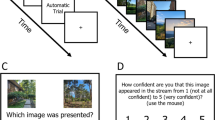Abstract
Proactive interference builds up rapidly in recall with the presentation of successive lists comprising items from a single category (e.g., animals). In two experiments, we used a similar build-up paradigm in prospective memory. Interestingly, in Experiment 1, there was no evidence of proactive interference in prospective memory, although build-up emerged in a similar recall task. In Experiment 2, by also showing proactive interference build-up in a recognition task analogous to our prospective memory task, we ruled out the possibility that it was the recognition processes inherent in the prospective memory task that might make the task easier and prevent proactive interference. We suggest that, under normal conditions, prospective memory is resistant to build-up of proactive interference and propose that this resistance is a function of the strengthening afforded by a cue-to-intention association that is a part of prospective memory tasks. We discuss the finding using the classical paired-associate learning framework.
Similar content being viewed by others
Notes
Although the onscreen instructions only made reference to working as accurately as possible, the experimenter explained verbally that it was also important to work as quickly as possible without losing accuracy.
References
Anderson, J. R. (1974). Retrieval of propositional information from long-term memory. Cognitive Psychology, 6(4), 451–474.
Battig, W. F., & Montague, W. E. (1969). Category norms of verbal items in 56 categories A replication and extension of the Connecticut category norms. Journal of Experimental Psychology, 80(No. 3, Part 2), 1–46.
Charness, N. (1976). Memory for chess positions: resistance to interference. Journal of Experimental Psychology: Human Learning and Memory, 2(6), 641–653.
Cicogna, P., Nigro, G., Occhionero, M., & Esposito, M. (2005). Time-based prospective remembering: interference and facilitation in a dual task. European Journal of Cognitive Psychology, 17(2), 221–240.
Cohen, A. L., Kantner, J., Dixon, R. A., & Lindsay, D. S. (2011). The intention interference effect. Experimental Psychology (formerly Zeitschrift für Experimentelle Psychologie), 58(6), 425–433.
Dallett, K. M. (1962). The transfer surface re-examined. Journal of Verbal Learning and Verbal Behavior, 1(2), 91–94.
Goschke, T., & Kuhl, J. (1993). Representation of intentions: persisting activation in memory. Journal of Experimental Psychology: Learning, Memory, and Cognition, 19(5), 1211.
Graf, P. (2005). Prospective memory retrieval revisited. In Dynamic cognitive processes (pp. 305–332). Tokyo: Springer.
Hicks, J. L., Marsh, R. L., & Russell, E. J. (2000). The properties of retention intervals and their affect on retaining prospective memories. Journal of Experimental Psychology: Learning, Memory, and Cognition, 26(5), 1160–1169.
Keppel, G., & Underwood, B. J. (1962). Proactive inhibition in short-term retention of single items. Journal of Verbal Learning and Verbal Behavior, 1(3), 153–161.
Loftus, E. F. (1971). Memory for intentions: the effect of presence of a cue and interpolated activity. Psychonomic Science, 23(4), 315–316.
Lustig, C., & Hasher, L. (2001). Implicit memory is vulnerable to proactive interference. Psychological Science, 12(5), 408–412.
Marsh, R. L., Hicks, J. L., & Watson, V. (2002). The dynamics of intention retrieval and coordination of action in event-based prospective memory. Journal of Experimental Psychology: Learning, Memory, and Cognition, 28(4), 652–659.
Martin, B. A., Brown, N. L., & Hicks, J. L. (2011). Ongoing task delays affect prospective memory more powerfully than filler task delays. Canadian Journal of Experimental Psychology/Revue canadienne de psychologie expérimentale, 65(1), 48–56.
McDaniel, M., & Einstein, G. (2007). Prospective memory: An overview and synthesis of an emerging field. Thousand Oaks: Sage Publications, Inc.
Murdock, B. B., Jr. (1964). Proactive inhibition in short-term memory. Journal of Experimental Psychology, 68(2), 184–189.
Occhionero, M., Esposito, M. J., Cicogna, P. C., & Nigro, G. (2010). The effects of ongoing activity on time estimation in prospective remembering. Applied Cognitive Psychology, 24(6), 774–791.
Osgood, C. E. (1949). The similarity paradox in human learning: a resolution. Psychological Review, 56(3), 132–143.
Penningroth, S. L., Graf, P., & Gray, J. M. (2012). The effect of a working memory load on the intention‐superiority effect: examining three features of automaticity. Applied Cognitive Psychology, 26(3), 441–450.
Petrusic, W. M., & Dillon, R. F. (1972). Proactive interference in short-term recognition and recall memory. Journal of Experimental Psychology, 95(2), 412–418.
Poppei, J. E., Finlay, B. L., & Tedford, W. H., Jr. (1970). Proactive inhibition in short-term memory. Journal of Experimental Psychology, 83(1), 189–190.
Rastle, K., Harrington, J., & Coltheart, M. (2002). 358,534 nonwords: the ARC nonword database. The Quarterly Journal of Experimental Psychology Section A, 55(4), 1339–1362.
Scullin, M., & McDaniel, M. (2010). Remembering to execute a goal: sleep on it! Psychological Science, 21(7), 1028–1035.
Underwood, B. (1957). Interference and forgetting. Psychological Review, 64(1), 49–60.
Wickens, D. D. (1970). Encoding categories of words: an empirical approach to meaning. Psychological Review, 77(1), 1–15.
Acknowledgments
Many thanks to Daniel Dickison for his programming help in data analysis. Communication concerning this article can be directed to either Joyce Oates, joyce.oates@american.edu, or Zehra Peynircioğlu, peynir@american.edu.
Author information
Authors and Affiliations
Corresponding author
Appendix. Example of the prospective memory task instructions for Experiment 1a
Appendix. Example of the prospective memory task instructions for Experiment 1a
You will see letter strings presented one at a time on the computer screen. Your task is to indicate if the string presented is a word or is a non-word by pressing the “N” (non-word) or “W” (word) button. For example, if you saw “word”, you would press “W” and if you saw “wurd”, you would press “N”. Please respond as accurately as you can for the word decision task. Some items may appear more than once.
In addition you will need to keep in mind 3 words, LIZARD, ZEBRA, and COYOTE. During the “Waiting…” screen following the word judgment response, press the:
-
red button if the word was LIZARD
-
green button if the word was ZEBRA
-
yellow button if the word was COYOTE
Finally, press either “N” or “W” to advance to the next trial.
Rights and permissions
About this article
Cite this article
Oates, J.M., Peynircioğlu, Z.F. & Bates, K.B. Is Event-Based Prospective Memory Resistant to Proactive Interference?. Curr Psychol 35, 632–637 (2016). https://doi.org/10.1007/s12144-015-9330-1
Published:
Issue Date:
DOI: https://doi.org/10.1007/s12144-015-9330-1




